![]()
![]()
![]()
Use LEFT and RIGHT arrow keys to navigate between flashcards;
Use UP and DOWN arrow keys to flip the card;
H to show hint;
A reads text to speech;
11 Cards in this Set
- Front
- Back
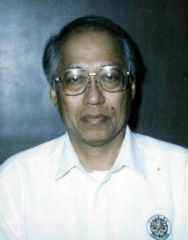
Cayetano vs. Monsod September 1991 Paras |
Filed the instant petition for certiorari and Prohibition praying that said confirmation and the consequent appointment of Monsod as Chairman of the Commission on Elections be declared null and void.
1987 Constitution provides in Section 1 (1), Article IX: " ... However, a majority thereof, including the Chairman, shall be members of the Philippine Bar who have been engaged in the practice of law for at least ten years."
xxxxxxxxxxxxxxxxxxxxxxxxxxxxxxxxxxxxxxxxxxxxxxxxxxxxxxxxxxxxxxxxxxxxxxxxxxxxxxxxxxxxxxxxxxxxx
We must interpret not by the letter that killeth, but by the spirit that giveth life.
The Commission on the basis of evidence submitted doling the public hearings on Monsod's confirmation, implicitly determined that he possessed the necessary qualifications as required by law. The judgment rendered by the Commission in the exercise of such an acknowledged power is beyond judicial interference except only upon a clear showing of a grave abuse of discretion amounting to lack or excess of jurisdiction. (Art. VIII, Sec. 1 Constitution). |
|
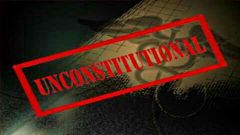
In re: Cunanan March 1954 Diokno |
Filed by House, vetoed by the President, Congress approved as a Senate bill, became a law without the President's signature.
xxxxxxxxxxxxxxxxxxxxxxxxxxxxxxxxxxxxxxxxxxxxxxxxxxxxxxxxxxxxxxxxxxxxxxxxxxxxxxxxxxxxxxxxxxxxx
Unconstitutionality of Republic Act No. 972: Bar Flunkers' Act of 1953
xxxxxxxxxxxxxxxxxxxxxxxxxxxxxxxxxxxxxxxxxxxxxxxxxxxxxxxxxxxxxxxxxxxxxxxxxxxxxxxxxxxxxxxxxxxxx
Laws are unconstitutional on the following grounds:
(1) They are not within the legislative powers of Congress to enact, or Congress has exceeded its powers (2) They create or establish arbitrary methods or forms that infringe constitutional principles (3) Their purposes or effects violate the Constitution or its basic principles.
Section 13, article VIII of the Constitution: Judiciary and legislative functions pertaining to admission to the Bar. |
|
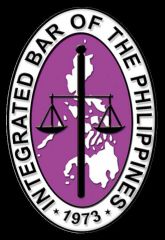
In the Matter of Integration of the IBP January 1973 Per Curiam |
(1)Does the Court have the power to integrate the Philippine Bar? (2)Would the integration of the Bar be constitutional? (3)Should the Court ordain the integration of the Bar at this time?
(1) The Court is of the view that it may integrate the Philippine Bar in the exercise of its power, under Article VIII, Sec. 13 of the Constitution, "to promulgate rules concerning pleading, practice, and procedure in all courts, and the admission to the practice of law."
(2) Hinges on the effects of Bar integration on the lawyer's constitutional rights of freedom of association and freedom of speech, and on the nature of the dues exacted from him.
(3) There is an overwhelming nationwide demand for Bar integration ( 14,555 out of 15,090 or 96.45 percent).
The Court, by virtue of the power vested in it by Section 13 of Article VIII of the Constitution, hereby ordains the integration of the Bar of the Philippines in accordance with the attached COURT RULE, effective on January 16, 1973. |
|
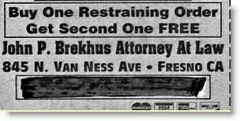
Director of Religious Affairs vs. Bayot March 1944 Ozaeta |
The respondent, who is an attorney-at-law, is charged with malpractice for having published an advertisement in the Sunday Tribune of June 13, 1943, promoting his services for commercial purposes.
Initially denied, and later admitted upon consultation with his attorney. Asked for indulgence and mercy and promised to never do it again.
xxxxxxxxxxxxxxxxxxxxxxxxxxxxxxxxxxxxxxxxxxxxxxxxxxxxxxxxxxxxxxxxxxxxxxxxxxxxxxxxxxxxxxxxxxxxx
Law is a profession and not a trade.
"The most worth and effective advertisement possible, even for a young lawyer, . . . is the establishment of a well-merited reputation for professional capacity and fidelity to trust. This cannot be forced but must be the outcome of character and conduct." (Canon 27, Code of Ethics.) |
|

In Re: Petition of Arturo Efren Garcia for admission to the Philippine Bar without taking the examination. August 1961 Barrera |
Filipino citizen from Negros, finished law degree in Spain and awarded "Licenciado En Derecho" in Madrid. He invoked a treaty made between Spain and Philippines that allows him to practice law in the Philippines without submitting bar requirements.
xxxxxxxxxxxxxxxxxxxxxxxxxxxxxxxxxxxxxxxxxxxxxxxxxxxxxxxxxxxxxxxxxxxxxxxxxxxxxxxxxxxxxxxxxxxxx
The Nationals of each of the two countries who shall have obtained recognition of the validity of their academic degrees by virtue of the stipulations of this Treaty, can practice their professions within the territory of the Other.
...subject to the laws and regulations of the latter.
xxxxxxxxxxxxxxxxxxxxxxxxxxxxxxxxxxxxxxxxxxxxxxxxxxxxxxxxxxxxxxxxxxxxxxxxxxxxxxxxxxxxxxxxxxxxx
Treaty applies to Filipino citizen to practice law in Spain and vice versa. He, however, is a Filipino citizen who wants to practice in the Philippines. Therefore, the treaty does not cover him.
The phrase means that it is still subject to the rules established by the proper authority that regulates the bar, thus, requiring compliance with their regulations including passing Philippine bar examination. |
|

Petition for Leave to Resume Practice of Law, Benjamin Dacanay December 2007 Corona |
Admitted to the bar in 1960, migrated to Canada in 1988 to seek medical ailments and subsequently became citizen of Canada in 2004 in order to avail of health benefits awarded to its citizens.
xxxxxxxxxxxxxxxxxxxxxxxxxxxxxxxxxxxxxxxxxxxxxxxxxxxxxxxxxxxxxxxxxxxxxxxxxxxxxxxxxxxxxxxxxxxxx
RA 9255 (Citizenship Retention and Re-Acquisition Act of 2003) Philippine citizens who become citizens of another country shall be deemed not to have lost their Philippine citizenship.
xxxxxxxxxxxxxxxxxxxxxxxxxxxxxxxxxxxxxxxxxxxxxxxxxxxxxxxxxxxxxxxxxxxxxxxxxxxxxxxxxxxxxxxxxxxxx
Granted subject to his compliance with other requirements: payment of annual IBP fees, continuing education units, payment of professional tax, and retaking of the lawyers oath. |
|
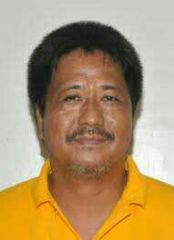
Re: Application for Admission to the Philippine Bar, Vicente Ching October 1999 Kapunan |
Vicente Ching is born from a Filipino mother and a father of Chinese national on April 11, 1964. He took the bar exam subject upon submission of proof of his Phil. Citizenship. He passed the bar at the age of 35 years old. There was a question regarding his citizenship therefore he was not allowed to take oath.
xxxxxxxxxxxxxxxxxxxxxxxxxxxxxxxxxxxxxxxxxxxxxxxxxxxxxxxxxxxxxxxxxxxxxxxxxxxxxxxxxxxxxxxxxxxxx
The court ruled that Ching, being the "legitimate child of a Chinese father and a Filipino mother born under the 1935 Constitution was a Chinese citizen and continued to be so, unless upon reaching the age of majority he elected Philippine citizenship" 1 in strict compliance with the provisions of Commonwealth Act No. 625.
He should elect his Phil. Citizenship within a reasonable period of time upon reaching the age of majority which is 21 years old at that time. With almost 14 years that elapsed upon reaching his age of majority, Ching failed to exercise such right of citizenship election beyond a reasonable period of time therefore he cannot be admitted in the Phil. Rolls of atty. for being a Chinese citizen. |
|
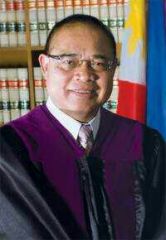
In the Matter of the Charges of Plagiarism, etc. Against Associate Justice Mariano Del Castillo October 2010 Per Curiam |
(1) Whether or not, in writing the opinion for the Court in the Vinuya case, Justice Del Castillo plagiarized the published works of authors Tams, Criddle-Descent, and Ellis.
(2) Whether or not Justice Del Castillo twisted the works of these authors to make it appear that such works supported the Courts position in the Vinuya decision.
xxxxxxxxxxxxxxxxxxxxxxxxxxxxxxxxxxxxxxxxxxxxxxxxxxxxxxxxxxxxxxxxxxxxxxxxxxxxxxxxxxxxxxxxxxxxx
(1) Plagiarism presupposes intent and a deliberate, conscious effort to steal anothers work and pass it off as ones own. There is no intent to pass it off as his own words, since passages remained attributed by the footnotes to the authors original sources, the omission of attributions to Criddle-Descent and Ellis gave no impression that the passages were the creations of Justice Del Castillo.
(2) The fact is that, first, since the attributions to Criddle-Descent and Ellis were accidentally deleted, it is impossible for any person reading the decision to connect the same to the works of those authors as to conclude that in writing the decision Justice Del Castillo twisted their intended messages. And, second, the lifted passages provided mere background facts that established the state of international law at various stages of its development. These are neutral data that could support conflicting theories |
|

In the Matter of the Charges of Plagiarism, etc. Against Associate Justice Mariano Del Castillo February 2011 Per Curiam |
Motion for reconsideration: allegedly the Court has by its decision legalized or approved of the commission of plagiarism in the Philippines.
xxxxxxxxxxxxxxxxxxxxxxxxxxxxxxxxxxxxxxxxxxxxxxxxxxxxxxxxxxxxxxxxxxxxxxxxxxxxxxxxxxxxx
A judge writing to resolve a dispute, whether trial or appellate, is exempted from a charge of plagiarism even if ideas, words or phrases from a law review article, novel thoughts published in a legal periodical or language from a partys brief are used without giving attribution. Thus judges are free to use whatever sources they deem appropriate to resolve the matter before them, without fear of reprisal. This exemption applies to judicial writings intended to decide cases for two reasons: the judge is not writing a literary work and, more importantly, the purpose of the writing is to resolve a dispute. As a result, judges adjudicating cases are not subject to a claim of legal plagiarism. |
|
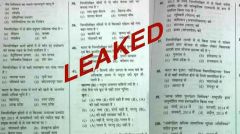
In Re: Vicente Sotto January 1949 Feria |
Whether or not Sotto is guilty of contempt. xxxxxxxxxxxxxxxxxxxxxxxxxxxxxxxxxxxxxxxxxxxxxxxxxxxxxxxxxxxxxxxxxxxxxxxxxxxxxxxxxxxxxxxxxxxxx Sotto has not responded any evidence and no single word can be found in his answers showing that he ever believed the imputations against him are based on fact. Attoryney as an officer of the courts is under a special obligation to be respectful in his conduct and communication to the courts, he may be removed from office or be stricken out from the roll of attorneys as being guilty of flagrant misconduct. |
|

Antero vs. Defensor-Santiago August 2009 Velasco |
Sen. Santiago made a privilege speech and part of the said "I spit on the face of Chief Justice" and "...rather be in another environment but not in the Supreme Court of idiots." Petitioner asks the court that disciplinary actions be taken against the respondent. xxxxxxxxxxxxxxxxxxxxxxxxxxxxxxxxxxxxxxxxxxxxxxxxxxxxxxxxxxxxxxxxxxxxxxxxxxxxxxxxxxxxxxxxxxxxx Whether or not the Court can do disciplinary actions against Sen. Santiago. xxxxxxxxxxxxxxxxxxxxxxxxxxxxxxxxxxxxxxxxxxxxxxxxxxxxxxxxxxxxxxxxxxxxxxxxxxxxxxxxxxxxxxxxxxxxx Respondent claimed that her speec is covered by parliamentary immunity, rooted at Article VI Section 11 of the Constitution: " No member shall be questioned nor be held liable in any other place for any speech or debate in the Congress or in any committee thereof." The Court however reminded the importance of giving utmost respect to the highest court of the land, most especially attorneys who are officers of the court like Sen. Santiago. |

